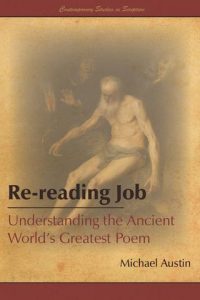 Title: Re-reading Job Understanding the Ancient World’s Greatest Poem
Title: Re-reading Job Understanding the Ancient World’s Greatest Poem
Author: Michael Austin
Publisher: Greg Kofford Books
Genre: Scriptural commentary
Year Published: 2014
Number of Pages: 174
Binding: Paperback
Reviewed by Rachel Helps
Yes! Biblical commentary from an LDS perspective! I’ve previously described Austin’s style as disarming, not just because of its approachable prose, but also because of the way he comes at material from new angles in an attitude of total sincerity. I admit I was a bit confused about why Austin wrote a book on Job to begin with, but he explains that as someone with experience doing literary analysis on ancient poems, it’s not that weird, because Job is a literary text. And its being a literary text (and not a historical one) doesn’t take away from what we can learn from the book. On the contrary, understanding the book’s genre helps us to ask the right questions of it.
Of course, simply asking the right questions doesn’t mean that the book of Job will 100% make sense or answer those questions, but we can stop wringing our hands about why God is making a deal with the devil and instead wonder why God appears to humans as unjust. I will confess to having the same basic (incorrect) assumptions about the book of Job–that it is a simple story about a man who stays faithful through many trials and receives temporal rewards for doing so. That’s the beginning and ending frame story, which is in a completely different style from the main poem. And the main poem subverts the frame story. It has Job wondering why God has been so unjust to him, and his friends telling him to please stop being so blasphemous (they at least sat with him in his suffering for a week before asking him to stop). And God comes to tell Job He’s asking the wrong questions and it’s confusing.
I think I’ve mentioned before that the Old Testament has seemed completely opaque to me, and that reading commentary has renewed my interest in it, to the extent that I am making the assumption that everyone else’s scripture study would benefit from reading commentary as well. And I’m also, frankly, a little disillusioned with the idea that the scriptures can mean whatever we want them to (or that we should read for the sake of obedience because we will receive unrelated revelation in reward for doing so), but I’m also torn, because I think it’s unreasonable to expect all people who believe in religious texts to become religious scholars. I’m having an existential crisis about how much importance Biblical commentary and exegesis should have in a global religion. I can say, at least, that it’s important for me.
I don’t think I’ll ever be able to sing “I Know that My Redeemer Lives” with the same conviction knowing that, in context, Job is asking to be redeemed from God’s own injustice. But Austin doesn’t just tear down our ideas about Job. He also builds them up, noting how the non-Jewish names and emphasis on service to the poor still make Job, thematically, very Christian to Christian interpretations.
A note on the ebook–about half of it is end matter and ads for other books from Kofford books. Be prepared for the book not to be as long as you’d hoped.
